
Bosnia and Herzegovina, abbreviated BiH or B&H, sometimes called Bosnia–Herzegovina and often known informally as Bosnia, is a country at the crossroads of south and southeast Europe, located in the Balkans. Bosnia and Herzegovina borders Serbia to the east, Montenegro to the southeast, and Croatia to the north and southwest. In the south it has a narrow coast on the Adriatic Sea within the Mediterranean, which is about 20 kilometres long and surrounds the town of Neum. Bosnia, which is the inland region of the country, has a moderate continental climate with hot summers and cold, snowy winters. In the central and eastern regions of the country, the geography is mountainous, in the northwest it is moderately hilly, and in the northeast it is predominantly flat. Herzegovina, which is the smaller, southern region of the country, has a Mediterranean climate and is mostly mountainous. Sarajevo is the capital and the largest city of the country followed by Banja Luka, Tuzla and Zenica.

Sarajevo is the capital and largest city of Bosnia and Herzegovina, with a population of 275,524 in its administrative limits. The Sarajevo metropolitan area including Sarajevo Canton, East Sarajevo and nearby municipalities is home to 555,210 inhabitants. Located within the greater Sarajevo valley of Bosnia, it is surrounded by the Dinaric Alps and situated along the Miljacka River in the heart of the Balkans, a region of Southern Europe.

Yugoslavia was a country in Southeast Europe and Central Europe for most of the 20th century. It came into existence after World War I in 1918 under the name of the Kingdom of Serbs, Croats and Slovenes by the merger of the provisional State of Slovenes, Croats and Serbs with the Kingdom of Serbia, and constituted the first union of the South Slavic people as a sovereign state, following centuries in which the region had been part of the Ottoman Empire and Austria-Hungary. Peter I of Serbia was its first sovereign. The kingdom gained international recognition on 13 July 1922 at the Conference of Ambassadors in Paris. The official name of the state was changed to Kingdom of Yugoslavia on 3 October 1929.

The General Framework Agreement for Peace in Bosnia and Herzegovina, also known as the Dayton Agreement or the Dayton Accords, is the peace agreement reached at Wright-Patterson Air Force Base near Dayton, Ohio, United States, on 21 November 1995, and formally signed in Paris, on 14 December 1995. These accords put an end to the three-and-a-half-year-long Bosnian War, one of the Yugoslav Wars.
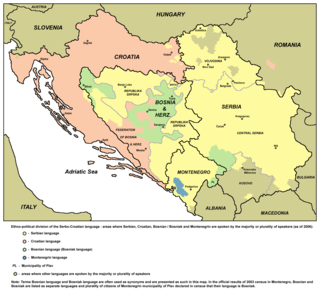
Bosnian is the standardized variety of the Serbo-Croatian pluricentric language mainly used by ethnic Bosniaks. Bosnian is one of three such varieties considered official languages of Bosnia and Herzegovina, along with Croatian and Serbian. It is also an officially recognized minority language in Croatia, Serbia, Montenegro, North Macedonia and Kosovo.

The siege of Sarajevo was a prolonged blockade of Sarajevo, the capital of Bosnia and Herzegovina, during the Bosnian War and the Bosnian genocide. After it was initially besieged by the forces of the Yugoslav People's Army, the city was then besieged by the Army of Republika Srpska from 5 April 1992 to 29 February 1996. It lasted three times longer than the Battle of Stalingrad, more than a year longer than the siege of Leningrad, a few months longer than the siege of Madrid, and the Siege of Deir ez-Zor and was the longest siege of a capital city in the history of modern warfare.

Republika Srpska is one of the two entities of Bosnia and Herzegovina, the other being the Federation of Bosnia and Herzegovina. It is located in the north and east of the country. Its largest city and administrative centre is Banja Luka, lying on the Vrbas river.

The Federation of Bosnia and Herzegovina is one of the two entities within the State of Bosnia and Herzegovina, the other being Republika Srpska. The Federation of Bosnia and Herzegovina consists of 10 autonomous cantons with their own governments and legislatures.
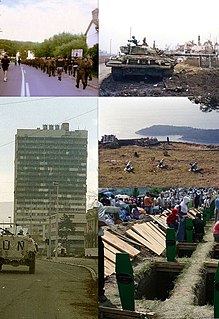
The Yugoslav Wars were a series of separate but related ethnic conflicts, wars of independence, and insurgencies that took place in the SFR Yugoslavia from 1991 to 2001. The conflicts both led up to and resulted from the breakup of Yugoslavia, which began in mid-1991, into six independent countries matching the six entities known as republics which previously composed Yugoslavia: Slovenia, Croatia, Bosnia and Herzegovina, Montenegro, Serbia, and North Macedonia. Yugoslavia's constituent republics declared independence due to unresolved tensions between ethnic minorities in the new countries, which fuelled the wars. While most of the conflicts ended through peace accords that involved full international recognition of new states, they resulted in a massive loss of life as well as severe economic damage to the region.
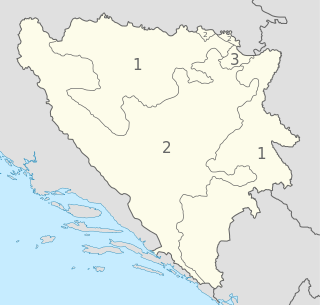
The political divisions of Bosnia and Herzegovina were created by the Dayton Agreement. The Agreement divides the country into two federal entities: the Federation of Bosnia and Herzegovina (FBiH) and the Republika Srpska (RS).
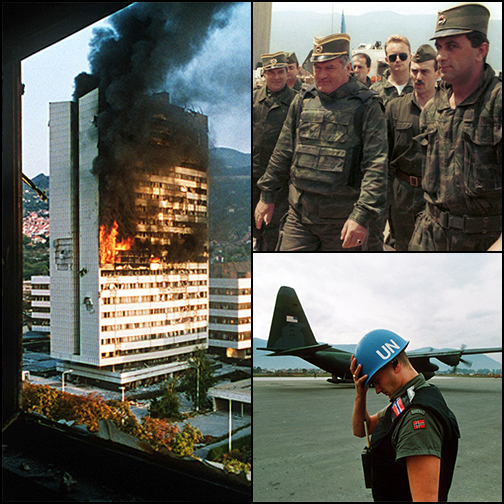
The Bosnian War was an international armed conflict that took place in Bosnia and Herzegovina between 1992 and 1995. The war is commonly seen as having started on 6 April 1992, following a number of earlier violent incidents. The war ended on 14 December 1995 when the Dayton accords were signed. The main belligerents were the forces of the Republic of Bosnia and Herzegovina and those of Herzeg-Bosnia and Republika Srpska, proto-states led and supplied by Croatia and Serbia, respectively.

The Football Association of Bosnia and Herzegovina, based in Sarajevo, is the chief officiating body of football in Bosnia and Herzegovina. The Bosnian football association was founded as the Sarajevo football sub-association of Yugoslavia in 1920. In 1992 the association was re-founded as the football association of Bosnia and Herzegovina.

The Bosnia and Herzegovina national football team represents Bosnia and Herzegovina in international football competitions, and is governed by the Football Association of Bosnia and Herzegovina. Until 1992, Bosnian footballers played for Yugoslavia.
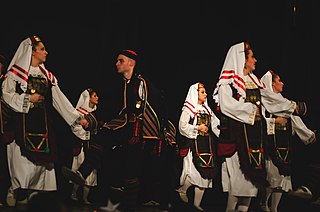
The Serbs of Bosnia and Herzegovina are one of the three constitutive nations of the country, predominantly residing in the political-territorial entity of Republika Srpska.

The Republic of Bosnia and Herzegovina was a state in Southeastern Europe, existing from 1992 to 1995. It is the direct legal predecessor to the modern-day state of Bosnia and Herzegovina.

The Socialist Republic of Bosnia and Herzegovina, commonly referred to as Socialist Bosnia or simply Bosnia, was one of the six constituent federal states forming the Socialist Federal Republic of Yugoslavia. It was a predecessor of the modern-day Bosnia and Herzegovina, existing between 1945 and 1992, under a number of different formal names, including Democratic Bosnia and Herzegovina (1943–1946) and People's Republic of Bosnia and Herzegovina (1946–1963).

Edin Džeko is a Bosnian professional footballer who plays as a striker for Serie A club Inter Milan and captains the Bosnia and Herzegovina national team.

The Croats of Bosnia and Herzegovina, often referred to as Bosnian Croats or Herzegovinian Croats are the third most populous ethnic group in the country after Bosniaks and Serbs, and are one of the constitutive nations of Bosnia and Herzegovina. Croats of Bosnia and Herzegovina have made significant contributions to the culture of Bosnia and Herzegovina. Most Croats declare themselves Catholics and speakers of Croatian language.

Archduke Franz Ferdinand of Austria, heir presumptive to the Austro-Hungarian throne, and his wife, Sophie, Duchess of Hohenberg, were assassinated on 28 June 1914 by Bosnian Serb student Gavrilo Princip. They were shot at close range while being driven through Sarajevo, the provincial capital of Bosnia-Herzegovina, formally annexed by Austria-Hungary in 1908.
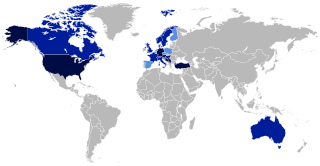
The Bosniaks are a South Slavic ethnic group native to the Southeast European historical region of Bosnia, which is today part of Bosnia and Herzegovina, who share a common Bosnian ancestry, culture, history and language. They primarily live in Bosnia, Serbia, Montenegro, Croatia, Kosovo as well as in Austria, Germany, Turkey and Sweden. They also constitute a significant diaspora with several communities across Europe, the Americas and Oceania.


















